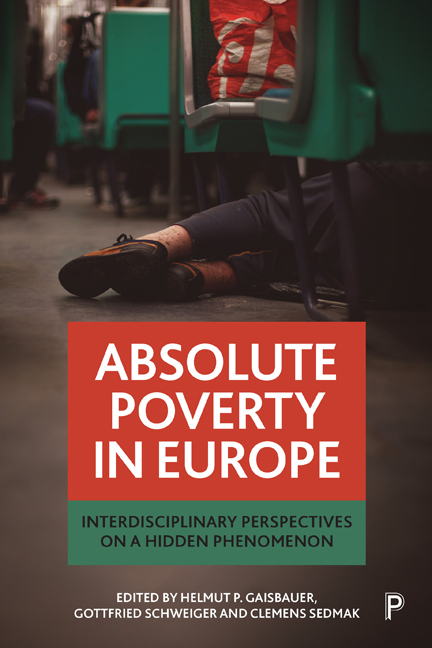Book contents
- Frontmatter
- Contents
- List of figures and tables
- Notes on contributors
- 1 Absolute poverty in Europe: introduction
- Part One Conceptual and methodological challenges
- Part Two Key issues for the absolute poor
- Part Three Policy responses to absolute poverty in Europe
- Part Four Ethical perspectives on absolute poverty in Europe
- Conclusion responding to the dark reality of absolute poverty in European welfare states
- Index
16 - Protection from poverty in the European Court of Human Rights
Published online by Cambridge University Press: 27 April 2022
- Frontmatter
- Contents
- List of figures and tables
- Notes on contributors
- 1 Absolute poverty in Europe: introduction
- Part One Conceptual and methodological challenges
- Part Two Key issues for the absolute poor
- Part Three Policy responses to absolute poverty in Europe
- Part Four Ethical perspectives on absolute poverty in Europe
- Conclusion responding to the dark reality of absolute poverty in European welfare states
- Index
Summary
Introduction
This chapter analyses the practice of the European Court of Human Rights (ECtHR, the Court), which gives judicial protection to some social and economic guarantees indispensable for the enjoyment of freedom from poverty while addressing civil and political rights. First it examines to what extent fighting poverty is a relevant issue for the judicial activism of the Court. Then it deals with the Court's methods of interpreting and applying the European Convention on Human Rights (ECHR, the Convention), as well as international and domestic law, to determine the normative basis, scope and conditions of judicial protection of basic socio-economic guarantees, such as access to food, water, sanitation, housing, clothing, health and social security. Finally it explores the virtues and shortcomings of the ECtHR's approach and discusses legal and political measures necessary to improve judicial protection of the poor in Europe.
Poverty as an issue at the European Court of Human Rights
Does protection from poverty belong to the ECtHR's specialisation?
The jurisdiction of the Court extends to all matters concerning the interpretation and application of the ECHR and Protocols (Article 32). Human rights guaranteed by the ECHR are predominantly civil and political rights. The ECtHR repeatedly emphasises that the ECHR ‘does not enshrine any “right not to be poor”’ (ECtHR's Seminar, 2013: 1). It ‘does not guarantee, as such, socio-economic rights, including the right to charge-free dwelling, the right to work, the right to free medical assistance, or the right to claim financial assistance from a State to maintain a certain level of living’ (Pančenko v Latvia).
The ECtHR, however, is a significant mechanism, which gives judicial protection to some socio-economic guarantees essential for the enjoyment of freedom from poverty. How does the ECtHR provide this protection? The answer may be found in the Court's vision of the relationship between civil and political rights, on the one hand, and socio-economic rights, on the other. The Court's approach is often interpreted as the protection of certain elements of socio-economic rights (De Schutter, 2002; Brems, 2007; Clements and Simmons, 2008; Palmer, 2009).
- Type
- Chapter
- Information
- Absolute Poverty in EuropeInterdisciplinary Perspectives on a Hidden Phenomenon, pp. 335 - 360Publisher: Bristol University PressPrint publication year: 2019



